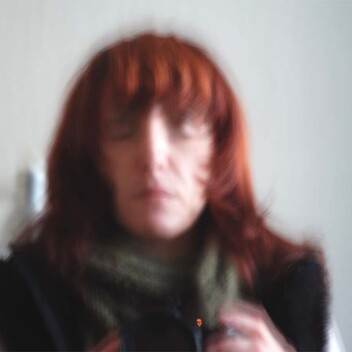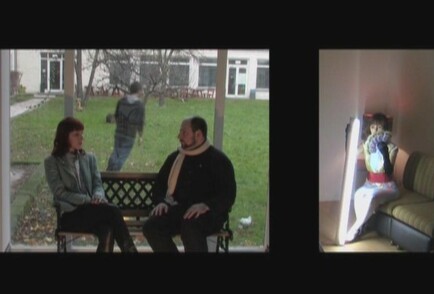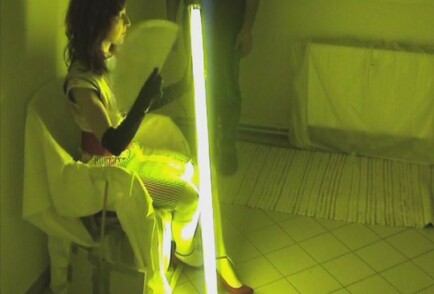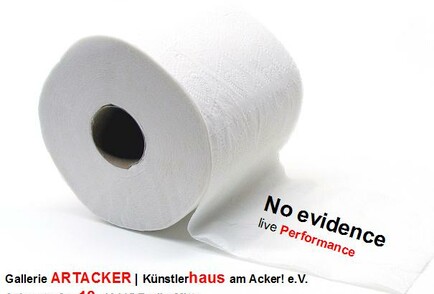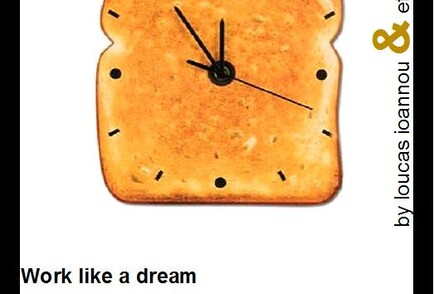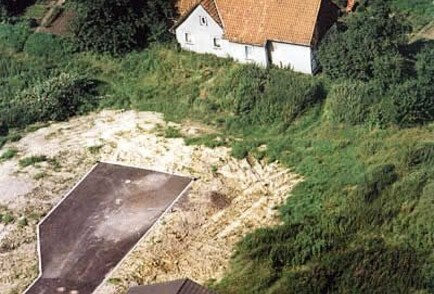Efthymia Kefala
UNLIMITED
In my work I treat narrative concerns, for what I have in mind as a main goal, is to expose the illusory nature of such mythopoetic attempts. I move carefully inbetween memory and time, as I explore the marginalized, controversial, and disruptive, revealed on the backround of fictionalizations. By screening my projective identifications with certain places or certain people I undergo the changes needed in order to relate with them. This procedure entails performative qualities that almost adds up to the protective screen of blindness as a location of mediation.
Thereby, the screen in my work is hidden or codified. From the very beginning I was concerned with space as recipient of internal pathos and at the same time as a protective screen smoothening the fit of rage against the unfulfilled desires that actually represent the mortified subject. This makes the beholder feel perplexed and motivates him/her to search inside my installations for his own private illusory personality, his own phantasm. By presenting overlays in time I consider Illusion to be the effect of an attempt to counterbalance the feedback from the external circumstances with a touch of cynicism. Hal Foster contends in his book “the Return of the Real” that “the function of the screen is to negotiate a laying down of the gaze as in a laying down of a weapon, for to see without this screen would be to be blinded by the gaze or touched by the real.” 1
Is it possible to share reality with the beholder? (Remapping and re-presenting)
I comment the fragmentary nature of human experience, revealed in unexpected places. By comparing the construction of the self captured in a crisis, I reflect on the self-referentiality of art, and reconstruct other possible critical phases as regards the subject and his psychic agents. By agents I mean the figurative language with the images that it contains. The image not only is it an object to look at, but it is also an object of interpretation. Insofar as it implies the potentiality to return a look, becomes on its own an object to pursue. Lacan speaks about the lost object as he comments on the subject “as a lost object. More precisely this lost object is the support of the subject and in many cases is a more abject thing than you may care to consider. In some cases it is something done, as all psychoanalysts and many people who have been psychoanalyzed know perfectly well.” 2 Hal Foster in his book Compulsive Beauty, suggests that Breton's conception of the found object anticipates Lacan's objet petit a--the lost object which sets desire in motion and which, paradoxically, represents both a hole in the integrity of our world and the thing that comes to hide the hole.
Similarly, Freud's famous metaphors of 'making the unconscious conscious' and 'where id was there shall ego be', implemented the perception of a difference in the psychic structure, that I try to analyse in the proposal of an installation with 9.800 spherical fountains in the size of a tennis ball apportioned in a tennis field. Id, ego, and super-ego, help us decifer the unconscious but mostly is a question of estimating the destructive forces in the individual and the society. I am interested in such procedures of disintegration in the autobiographical narratives where the fiction displaces the self by composing the NEW, in other words the anticipation for the future is reflected upon. The Past, the Present and the Future are platforms enabling us to set up forms of contingent developments that explain our existence based on the notion of reason or truth but always form a fiction, a wish to set up a story in a particular way.
Thereby, what I find most exiting is literature, and the 'rewriting' that takes place in the unconscious but is always dominated by the ideology drawing priority, and it is different for each society which read the literary works. By contemplating the impression on external spaces, I go through an analytical procedure, which facilitates the countebalance of the alienation produced through ideological constructions. Terry Eagleton argues that: "The largely concealed structure of values which informs and underlies our factual statements is part of what is meant by 'ideology'. By 'ideology' he means, roughly, the ways in which what we say and believe connects with the power-structure and power-relations of the society we live in". (13, "Literary Theory"). Each of us have to seek in order to find the subject or the referent in order to create the new one (:create meaning).3 For instance, I constitute a subject, an observer effecting subjectivity, hence not only generating and defining objects, but also defined by them. To display the spatial relationships generated by the viewer might give support or relief to the trends and narratives emerging from the part of space within one´s immediate vicinity, or it simply works the other way round. I approach such functions in connection to the certain place which is being 'activated'. It is like bringing about situations that make manipulation obvious or in other words reveals the conventional element in our activities.
narrative in orientation (‘spatio-temporal’ narratives)
Just as the conscious part prevails over our past thoughts and feelings, the unconscious also raises the question of the hidden meanings that constitutes a subject. For Lacan this metaphor of being is focused on language as a complex formation which become manifest in the signifying chain, an interconnected system of signifiers or words acting in counterbalance to the things or ideas represented, making the signified. In other words his theory contends that the unconscious is structured like a language. “It is a thinking with words, with thoughts that escape your vigilance, your state of watchfulness.” 4 I attend such thoughts guiding us in making or viewing pictures, by reconstructing common cultural problems into installations fulfiling the function of a game procedure where the beholder has to be involved and find out the hidden meaning in his own marooned private world. So the participation in the actions and discources supplementing my I-constructions, is deputing power to all my senses. I translate from the affective aspects of my consciousness into archivated structures inviting the viewer to search them. I reset the events of my life into a NEW game. The object being to the point, is yielding up its secrets to the subject who focuses upon it, and in that way constitutes a closed-circuit system around a traumatic core.
experience of alienation (Fremderfahrungen)
The intervention in public space is a matter of treating the abject that exists in-between the concept of the subject and the object, and always returns and seeks to be restored. I intend to make this suppressed wish visible by analysing formations of subjectivity, that depend on the role that the big Other plays in our constitution. According to Lacan the Other is the gaze that is outside and struggles with the individual, arranged as self or as the phenomenon of identity which resists change. By reproducing from memory social occasions /events coming to pass in my life, I fathom my ´desire´, that according to Jaques Lacan is the “desire to be the Other”. It is a kind of a delicate game where derangement, distance or “making strange” becomes part of the poetic licence, in order to be able to articulate this 'becoming other to itself' as the condition of real experience. Everybody can become the author by playing a role in one´s own story and unfold his thoughts in spoken words. The communication or expression of thoughts in spoken words is vital for the human being, for it signals one´s “access to the SYMBOLIC, in this case to the site of picture making and viewing, where we can manipulate and moderate the gaze.”5
With my work I allude to the unconscious subject and its disfunctions, and try to regenerate the powers of the beholder by awaking his desire to play and gain knowledge or understanding through his own productions of space. Diversity is a position to be attained by a continual process of relieving congestion and reinvention of the physical space. Furthermore, the subjective experience has to be infiltrated before getting stuck in a representation of the world that is permeable to one-sided choices abetting operations like phobia, hysteria or obsession. Exchange and communication are matters of awareness of oneself in relation to others, within multiple spatial/ social frames, and shouldn´t they be simply dissociated or depleted from their original meaning.
In the Master Degree Program Raumstrategien, as well as in the future, I will be bothered by the limitations of the subject, that will be intrigued in other dynamic relations, with the ambition to reveal his sensible poetic functions in accordance with a fictionalised reality. Interactions with such a subject are configurations, that open up to view but don´t really correspond with the objects that give form to its wishes. Feigned unlimited but though confined to his scheduled functions, it outlines its strategic leveraging of its capacity for play as a complex spatial/ social practice within a contradictory and unstable system of valuation. Last but not least, the complexity of social spaces incites me to search for a symbolic language of power relationships that make up the metaphors for institutional machinations of politics.
- 1) The return of the real.The Avant- Garde at the End of the Century, Hal Foster, Chapter 5, page 140
- 2) http://www.lacan.com/hotel.htm
- 3) http://www.lacan.com/hotel.htm
- 4) http://www.colorado.edu/English/courses/ENGL2012Klages/lacan.html, To explain that function i use a phrase of Dr. Mary Klages from his treatise on Jaques Lacan: “The sign is something that represents something for somebody, but the signifier is something that represents a subject for another signifier.”
*5) The return of the real.The Avant- Garde at the End of the Century, Hal Foster, Chapter 5, page 140
